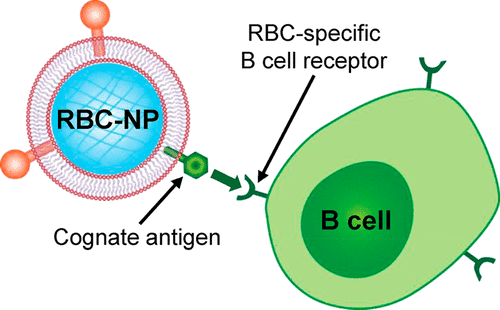当前位置:
X-MOL 学术
›
Mol. Pharmaceutics
›
论文详情
Our official English website, www.x-mol.net, welcomes your
feedback! (Note: you will need to create a separate account there.)
Biomimetic Targeting of Nanoparticles to Immune Cell Subsets via Cognate Antigen Interactions
Molecular Pharmaceutics ( IF 4.5 ) Pub Date : 2018-03-13 00:00:00 , DOI: 10.1021/acs.molpharmaceut.8b00074 Brian T. Luk,Yao Jiang,Jonathan A. Copp,Che-Ming J. Hu,Nishta Krishnan,Weiwei Gao,Shulin Li,Ronnie H. Fang,Liangfang Zhang
Molecular Pharmaceutics ( IF 4.5 ) Pub Date : 2018-03-13 00:00:00 , DOI: 10.1021/acs.molpharmaceut.8b00074 Brian T. Luk,Yao Jiang,Jonathan A. Copp,Che-Ming J. Hu,Nishta Krishnan,Weiwei Gao,Shulin Li,Ronnie H. Fang,Liangfang Zhang

|
Within the body, cellular recognition is mediated in large part by receptor–ligand interactions that result from the surface marker expression of the participant cells. In the case of immune cells, these interactions can be highly specific, enabling them to carry out their protective functions in fighting off infection and malignancy. In this work, we demonstrate the biomimetic targeting of antigen-specific immune cell populations by using nanoparticles functionalized with natural membrane derived from cells expressing the cognate antigen. Using red blood cell (RBC)-specific B cells as a model target, it is shown that RBC membrane-coated nanoparticles exhibit enhanced affinity compared with control nanoparticles. The concept is further demonstrated using murine models of alloimmunity and autoimmunity, where B cells elicited against RBCs can be positively labeled using the biomimetic nanoparticles. This strategy for antigen-specific immune cell targeting may have utility for the detection and treatment of various autoimmune conditions, and it may additionally have implications for the prevention of immune cell malignancies.
中文翻译:

纳米粒子通过同源抗原相互作用对免疫细胞亚群的仿生靶向。
在人体内部,细胞识别很大程度上是由参与细胞表面标志物表达引起的受体-配体相互作用介导的。在免疫细胞的情况下,这些相互作用可能具有高度特异性,从而使其能够发挥保护功能来抵抗感染和恶性肿瘤。在这项工作中,我们证明了通过使用天然膜功能化的,由表达同源抗原的细胞衍生的天然膜功能化的功能,可对抗原特异性免疫细胞群体进行仿生靶向。使用红细胞(RBC)特定的B细胞作为模型目标,表明与对照纳米颗粒相比,RBC膜包裹的纳米颗粒表现出增强的亲和力。使用同种免疫和自身免疫的鼠模型进一步证明了这一概念,使用仿生纳米颗粒可以对标记为RBC的B细胞进行阳性标记。抗原特异性免疫细胞靶向的这种策略可用于检测和治疗各种自身免疫疾病,并且可能另外对预防免疫细胞恶性肿瘤有影响。
更新日期:2018-03-13
中文翻译:

纳米粒子通过同源抗原相互作用对免疫细胞亚群的仿生靶向。
在人体内部,细胞识别很大程度上是由参与细胞表面标志物表达引起的受体-配体相互作用介导的。在免疫细胞的情况下,这些相互作用可能具有高度特异性,从而使其能够发挥保护功能来抵抗感染和恶性肿瘤。在这项工作中,我们证明了通过使用天然膜功能化的,由表达同源抗原的细胞衍生的天然膜功能化的功能,可对抗原特异性免疫细胞群体进行仿生靶向。使用红细胞(RBC)特定的B细胞作为模型目标,表明与对照纳米颗粒相比,RBC膜包裹的纳米颗粒表现出增强的亲和力。使用同种免疫和自身免疫的鼠模型进一步证明了这一概念,使用仿生纳米颗粒可以对标记为RBC的B细胞进行阳性标记。抗原特异性免疫细胞靶向的这种策略可用于检测和治疗各种自身免疫疾病,并且可能另外对预防免疫细胞恶性肿瘤有影响。











































 京公网安备 11010802027423号
京公网安备 11010802027423号